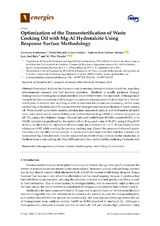Mostrar el registro sencillo del ítem
Optimization of the Transesterification of Waste Cooking Oil with Mg-Al Hydrotalcite Using Response Surface Methodology
| dc.contributor.author | Costarrosa Morales, Laureano | |
| dc.contributor.author | Leiva-Candia, David Eduardo | |
| dc.contributor.author | Cubero-Atienza, Antonio J. | |
| dc.contributor.author | Ruiz, Juan José | |
| dc.contributor.author | Dorado, M.P. | |
| dc.date.accessioned | 2018-10-02T08:04:08Z | |
| dc.date.available | 2018-10-02T08:04:08Z | |
| dc.date.issued | 2018 | |
| dc.identifier.uri | http://hdl.handle.net/10396/17207 | |
| dc.description.abstract | Nowadays, biodiesel has become a very promising alternative to fossil diesel fuel, regarding environmental concerns and fuel resource depletion. Biodiesel is usually produced through homogeneous or heterogeneous transesterification of different fatty raw materials. Although main research has been carried out with homogenous catalysts, heterogeneous catalysts may be of interest due to ease of recovery and recycling, as well as readiness for continuous processing. In this work, calcined Mg-Al hydrotalcite (HT) was used for the heterogeneous transesterification of waste cooking oil. Three reaction parameters, namely, reaction time, amount of catalyst, and methanol-to-oil molar ratio, were optimized by means of Response Surface Methodology (RSM) at constant temperature (65 C), using a Box-Behnken design. Optimal fatty acid methyl ester (FAME) content (86.23% w/w FAME/sample) was predicted by the model with an R-squared value of 98.45%, using 3.39 g of HT (8.5% w/w oil) and an 8:1 methanol-oil molar ratio, for a duration of 3.12 h. It was observed that calcination of HT, while avoiding the previous washing step, allowed the presence of chemical species that enhanced the effect of the catalyst. It can be concluded from this field trial that calcined and nonwashed Mg-Al hydrotalcite may be considered an effective basic catalyst for the production of biodiesel from waste cooking oil. Also, RSM proved to be a useful tool for predicting biodiesel yield. | es_ES |
| dc.format.mimetype | application/pdf | es_ES |
| dc.language.iso | eng | es_ES |
| dc.publisher | MDPI | es_ES |
| dc.rights | https://creativecommons.org/licenses/by/4.0/ | es_ES |
| dc.source | Energies 11, 302 (2018) | es_ES |
| dc.subject | Heterogeneous catalysis | es_ES |
| dc.subject | Biofuel | es_ES |
| dc.subject | Diesel engines | es_ES |
| dc.subject | Used frying oil | es_ES |
| dc.subject | Simulation | es_ES |
| dc.title | Optimization of the Transesterification of Waste Cooking Oil with Mg-Al Hydrotalcite Using Response Surface Methodology | es_ES |
| dc.type | info:eu-repo/semantics/article | es_ES |
| dc.relation.publisherversion | http://dx.doi.org/10.3390/en11020302 | es_ES |
| dc.relation.projectID | Gobierno de España. ENE2013-47769-R | es_ES |
| dc.relation.projectID | Junta de Andalucía. TEP-4994 | es_ES |
| dc.rights.accessRights | info:eu-repo/semantics/openAccess | es_ES |

